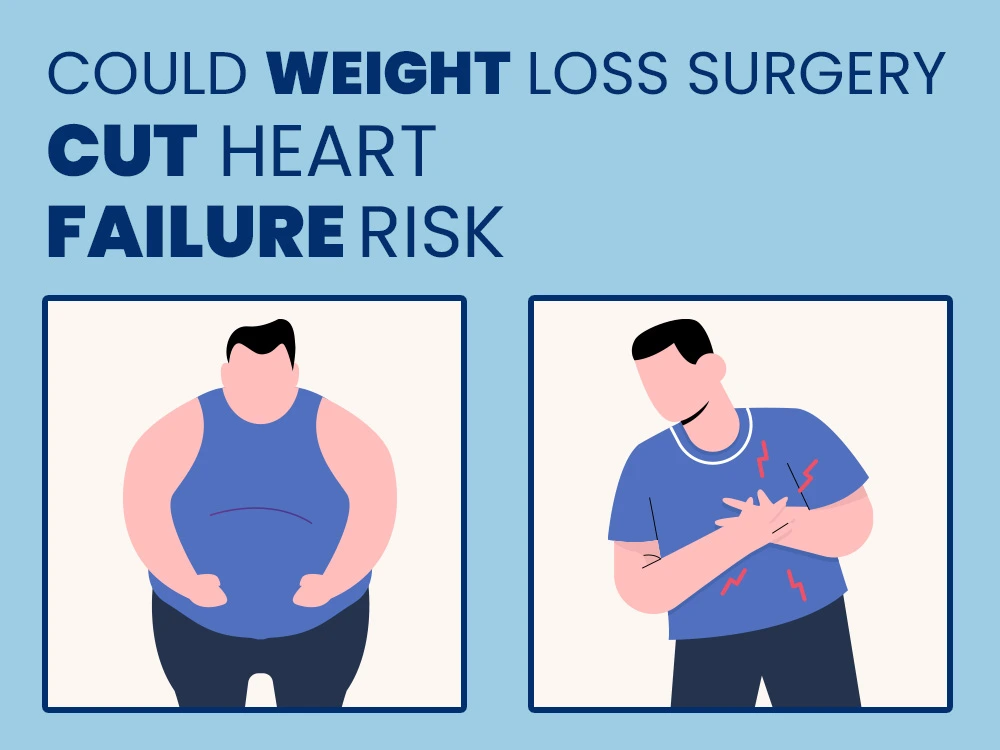
Weight loss surgery, often referred to as bariatric surgery, has long been seen as a solution for individuals struggling with severe obesity. But beyond its role in helping patients lose weight, new research suggests that bariatric surgery could play a significant role in reducing the risk of heart failure—a condition that often arises due to obesity and its associated health complications. But how exactly does weight loss surgery impact heart health, and should it be considered for individuals at risk of heart failure? In this post, we explore the connection between bariatric surgery and heart failure, as well as the potential benefits of the procedure for heart health.
What Is Heart Failure and How Is It Linked to Obesity?
Heart failure is a chronic condition in which the heart is unable to pump enough blood to meet the body’s needs. It can result from a variety of factors, including coronary artery disease, high blood pressure, and previous heart attacks. While heart failure can affect people of all sizes, obesity is a major risk factor.
Obesity places a significant burden on the heart, leading to higher rates of high blood pressure, insulin resistance, and increased inflammation—conditions that are closely linked to heart failure. For people who are severely obese, the risk of developing heart failure is substantially higher due to these compounded health issues.
Additionally, obesity often leads to a condition called sleep apnea, which can strain the heart and exacerbate heart failure. When combined with other risk factors such as diabetes and high cholesterol, obesity presents a significant threat to heart health.
How Weight Loss Surgery Can Help Lower Heart Failure Risk
Bariatric surgery, including procedures like gastric bypass and sleeve gastrectomy, has shown great promise in reducing the risks associated with obesity. These surgeries are effective in promoting substantial weight loss, which in turn improves overall health, including cardiovascular health. But how exactly does weight loss surgery contribute to heart health and potentially lower the risk of heart failure?
1. Reducing High Blood Pressure (Hypertension)
One of the leading causes of heart failure is high blood pressure. When blood pressure remains high for extended periods, it can damage the heart and lead to its eventual failure. Bariatric surgery has been shown to significantly reduce blood pressure in patients, with some individuals even experiencing a reversal of hypertension after surgery. The weight loss associated with bariatric surgery reduces the strain on the cardiovascular system, helping to normalize blood pressure levels.
2. Improving Blood Sugar Control
Obesity is a key factor in the development of type 2 diabetes, which is another significant risk factor for heart failure. Elevated blood sugar levels can damage the blood vessels and increase the risk of coronary artery disease and heart failure. Bariatric surgery has a profound impact on blood sugar control, with many patients experiencing remission or significant improvement in their diabetes following surgery.
The improved blood sugar levels not only help patients manage their diabetes but also reduce the strain on their heart. This, in turn, lowers the risk of heart failure, especially for patients who have struggled to control their blood sugar through diet and exercise alone.
3. Reducing Inflammation
Chronic inflammation is another factor that contributes to heart disease and heart failure. Obesity leads to increased levels of inflammatory markers in the body, which in turn contribute to the development of atherosclerosis (plaque buildup in the arteries), coronary artery disease, and heart failure.
Bariatric surgery reduces inflammation in the body, which can help reverse the process of plaque buildup in the arteries. As patients lose weight and adopt healthier lifestyles, the reduction in systemic inflammation supports improved heart health and reduces the risk of developing heart failure.
4. Lowering Cholesterol and Improving Lipid Profiles
Obesity often leads to an imbalance in cholesterol levels, with high levels of LDL (bad cholesterol) and low levels of HDL (good cholesterol). This imbalance is a major contributor to heart disease and heart failure. Weight loss surgery can improve lipid profiles by lowering LDL cholesterol and increasing HDL cholesterol levels.
By improving these cholesterol levels, bariatric surgery helps to reduce the risk of developing coronary artery disease, which is a primary cause of heart failure. Lower cholesterol also reduces the risk of plaque buildup in the arteries, further reducing the strain on the heart.
5. Enhancing Physical Activity and Exercise Tolerance
For individuals with severe obesity, physical activity can be difficult due to joint pain, fatigue, and shortness of breath. These limitations often make it difficult to engage in regular exercise, which is essential for maintaining heart health. Bariatric surgery helps patients lose weight, which can significantly improve their ability to engage in physical activity.
Increased physical activity promotes cardiovascular health, strengthens the heart, and reduces the risk of heart failure. As patients lose weight and become more active, their heart health improves, contributing to a reduced risk of developing heart failure over time.
What to Consider Before Opting for Bariatric Surgery
While bariatric surgery offers numerous benefits for heart health, it is not without its risks and considerations. Before opting for surgery, it is crucial to consult with a healthcare provider who specializes in weight loss surgery. Bariatric surgery may not be appropriate for everyone, and there are certain risks associated with the procedure, including complications from surgery and the need for lifelong dietary adjustments.
At Novemedical, we provide a comprehensive bariatric surgery consultation to help you determine whether surgery is the right option for your health needs. We take into account your medical history, current health status, and goals to provide personalized recommendations for weight loss and heart health.
Post-Operative Care and Heart Health
After bariatric surgery, ongoing care and support are essential to ensuring a successful recovery and long-term health improvements. At Novemedical, we provide post-operative care to monitor your progress and help you make adjustments to your diet and lifestyle. Our team will work with you to ensure that you continue to see improvements in your heart health, blood sugar levels, and overall well-being.
It’s also essential to monitor your heart health after surgery through regular check-ups, especially if you had a history of heart failure or cardiovascular disease. This ongoing care helps ensure that any potential issues are caught early and managed effectively.
Weight loss surgery is more than just a tool for losing weight—it has the potential to significantly improve heart health and reduce the risk of heart failure. By addressing key risk factors such as high blood pressure, diabetes, inflammation, and cholesterol levels, bariatric surgery offers heart failure patients a way to improve their quality of life and reduce their cardiovascular risks.
If you’re considering weight loss surgery as a means to improve your heart health, Novemedical is here to guide you through every step of the process. From consultation to post-operative care, we are committed to helping you achieve optimal health and wellness.
For more information about bariatric procedures like gastric bypass or sleeve gastrectomy, request a free consultation today.





